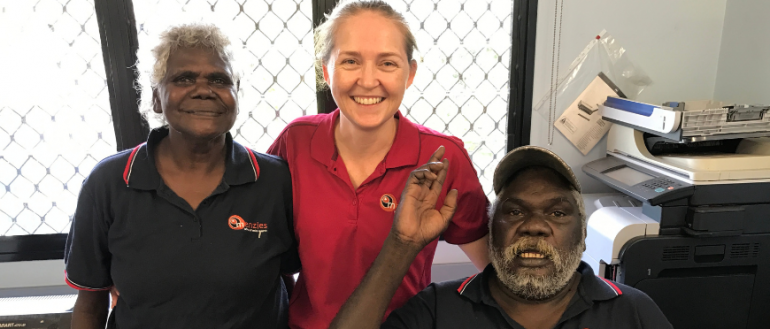Funders:
- National Health and Medical Research Council
Collaborators:
- Miwatj Health Aboriginal Corporation
- Victorian Infectious Diseases Reference Laboratory
Summary:
Hepatitis B virus (HBV) is common in the NT, with 3% to 15% of Aboriginal and Torres Strait adults infected. HBV makes significant contribution to morbidity and mortality in the form of cirrhosis and liver cancer. This study will provide epidemiological information crucial to planning appropriate, effective, and economically sustainable responses in line with the National Hepatitis B Strategy and ensuring holistic hepatitis B care is available to all patients.
Aims:
The Galiwin’ku sero-survey - establishing the size of the problem in Galiwin’ku - “Know Your Hep B Status” - project aims are:
- To establish the sero-prevalence of chronic hepatitis B (CHB) in Galiwin’ku.
- To look for occult hepatitis B infection in Galiwin’ku.
- To investigate the effect of sub-genotype C4 on vaccine efficacy.
- To give all residents of Galiwin’ku a CHB sero-status.
Objectives:
The CHB sero-status of all Galiwin’ku residents will be established and they will be directed to the most appropriate care pathway. Residents will know if they require treatment for CHB, vaccination against it or if they are immune.
We are trialling two different novel diagnostic tests alongside the serology tests.
Implications for policy and practice:
The results from this model have been used to determine the CHB status of all Aboriginal and Torres Strait Islander individuals across the Northern Territory (Hep B PAST).
This study provided baseline epidemiological evidence crucial to planning appropriate, effective, and economically sustainable responses in line with the National Hepatitis B Strategy. It has established a model for holistic, community-driven, primary health-based hepatitis B care.
Chief Investigators:
Project manager:
Contact information:
Project dates:
The project commenced in 2015 and is ongoing.
- Davies J, Boutlis CS, Marshall CS, Tong SYC, Davis JS. The unique aspects of chronic hepatitis B infection in Aboriginal and Torres Strait Islander people. Internal Medicine Journal 48 (2018) 484-485
- Cheah BC, Davies J, Singh GR, Wood N, Jackson K, Littlejohn M, Davison B, McIntyre P, Locarnini S, Davis JS, Tong SYC. Sub-optimal protection against past hepatitis B virus infection where subtype mismatch exists between vaccine and circulating viral genotype in northern Australia. Vaccine 36 (2018) 3533-3540
- Davies J, Qin Li S, Tong SYC, Baird RW, Beaman M, Higgins G, Cowie BC, Condon JR, Davis JS. Establishing contemporary trends in hepatitis B sero-epidemiology in an Indigenous population. PLoS ONE 12(9) 2017.
- Davies J, Bukulatjpi S, Sharma S, Caldwell L, Johnston V, Davis J. Development of a Culturally Appropriate Bilingual Electronic App About Hepatitis B for Indigenous Australians: Towards Shared Understandings. 2015;4:e70.
- Littlejohn M, Davies J, Yuen L, Tong S, Davis JS, Locarnini S. Molecular virology of Hepatitis B virus, subgenotype C4 in Northern Australian Indigenous populations. Journal of Medical Virology 2014; 86: 695-706
- Davies J, Bukulatjpi S, Sharma S, Davis J, Johnston V. “Only your blood can tell the story” – a qualitative research study using semi-structured interviews to explore the hepatitis B related knowledge, perceptions and experiences of remote dwelling Indigenous Australians and their health care providers in northern Australia. BMC Public Health 2014, 14:1233
- Parker C, Tong SYC, Dempsey K, Condon J, Sharma S, Chen JWC, Sievert W, Davis JS. Hepatocellular carcinoma in Australia’s Northern Territory – high incidence and poor outcomes. Medical Journal of Australia 2014; 201(8): 470-47.
- Davies J, Littlejohn M, Locarnini SA, Whiting S, Hajkowicz K, Cowie BC, Bowden DS, Tong SYC, Davis JS. The molecular epidemiology of hepatitis B in the Indigenous people of northern Australia. Journal of Gastroenterology and Hepatology 2013; 28(7): 1234-1241.

